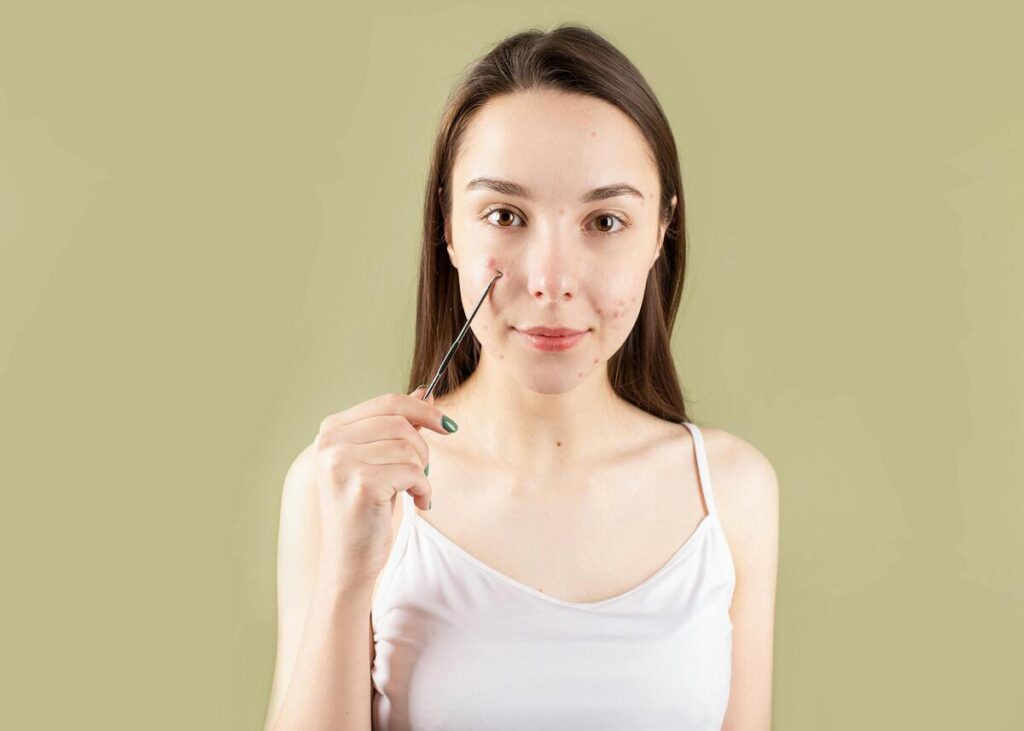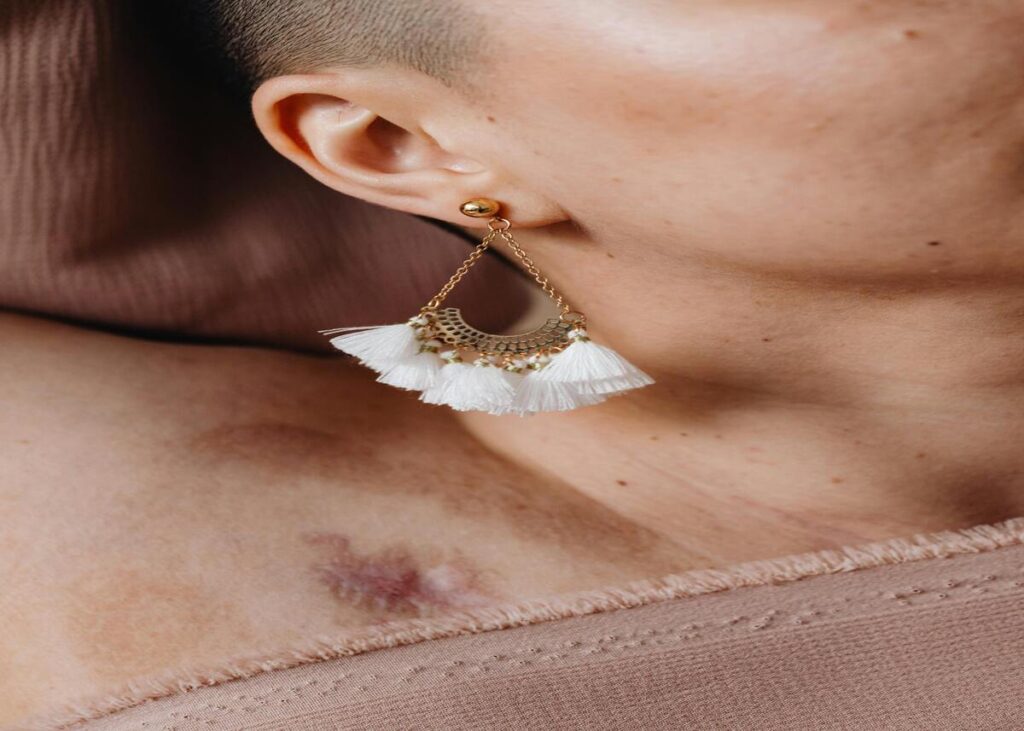
You are likely reading this for two reasons: you have been diagnosed with acne and are worried about it turning into something serious, or you want to reduce acne scars. Acne scars are permanent textural changes in the skin that result from severe or inflamed acne lesions.
When your skin breaks out, the inflammation caused by acne has the potential to damage the tissue under the surface of your skin. As your body works to repair this damage, it leads to scars that either indent the skin or leave, raised bumpy marks. The type of acne you experience can influence the kind of scars you develop; for example, ice pick scars are a specific type of acne scar characterized by deep, narrow indentations.
Now, I understand how frustrating it can be to deal with these scars. They can make you feel self-conscious, affecting not only your appearance but also how you feel about yourself. It’s important to distinguish between marks and scars: marks are temporary discolorations left after acne heals, while scars are permanent changes in skin texture.
This is why at the end of this article, you will learn some ways you can handle your acne scarring. Whether you’re dealing with scars that have been with you for years or want to take preventive measures, there’s something for everyone. Let’s get right into it—here are the key ways to address acne scars.

Source:
Acne scars come in many forms, and each type requires a different approach. The type of scar you have will determine the most effective treatment method.
First, there’s post-inflammatory hyperpigmentation (PIH). This type of scarring isn’t a true scar in the traditional sense but rather dark spots or patches that remain after a pimple has healed.
Then, there are pitted scars. These scars occur when there’s tissue loss, leaving behind depressions in the skin.
On the other hand, there are raised keloid scars. Unlike pitted scars, these occur when the skin produces too much collagen during the healing process, leading to raised, thickened areas that can be itchy or uncomfortable. This type of scar is more common in people with darker skin and can be particularly stubborn when it comes to treatment.
Identifying your acne type is the first step toward finding the right treatment. By knowing whether you’re dealing with PIH, pitted scars, or keloids, you can tailor your skincare routine to target these specific issues. Treatment options will vary depending on the type of scar present, so it’s important to match your approach to the characteristics of scars you have. Always tailor your skincare routine to the type of scar, and focus your treatments on the specific needs of the scar type for best results.

Developing a skincare routine that specifically targets acne scarring is not just about treating the scars you already have; it’s about giving your skin the nourishment it needs to heal and regenerate, preventing new scars from forming.
One of the key ways on learning how to reduce acne scars is to choose the right products and ingredients that work in your favor. Together they reduce inflammation, promote collagen production, and improve overall skin texture. You can do your research or consult a licensed and experienced dermatologist if you can afford one.
In addition, consistency is key. The best skincare routine is one that you can stick to daily. Be patient with your skin and give these products time to work. Healing acne scars is a gradual process, but with the right routine, you’ll see improvements in your skin’s texture, tone, and overall appearance.

Sometimes a good skincare routine isn’t enough to heal your acne scarring. That’s where professional treatments come in. Although they might be more expensive, but they offer more intensive options to help reduce the appearance of stubborn acne scars.
For example, chemical peels help reduce acne scars by exfoliating the skin‘s top layer to reveal smoother skin underneath. They can improve hyperpigmentation and mild scarring but may cause redness and peeling but multiple sessions may be needed.
Microdermabrasion gently sands the skin’s surface to boost collagen and improve texture. It’s less invasive and suitable for shallow scars, with minimal downtime.
Laser therapy targets deeper skin layers to smooth out scars and stimulate collagen. It requires several sessions but some risks involved include temporary redness and swelling.
Microneedling uses tiny needles to stimulate collagen production and treat deep scars. Dermal fillers and subcision can also treat deep scars.
Fillers raise scars to match the surrounding skin, while subcision breaks up scar tissue. Costs for all these treatments vary widely based on treatment and number of sessions.
Each of these professional treatments offers unique benefits but, they also come with risks and costs that should be carefully considered. It’s best to consult a dermatologist who can assess your skin type and the severity of your scars and recommend the best course of action for you. for a smoother, more even-toned skin.

While skincare products and professional treatments are important, adopting healthy habits can make a big difference in how your skin heals and how effective your treatments are. Here’s how lifestyle changes can be used to support your journey toward clearer, more even-toned skin.
A balanced diet is important for healthy skin. Eating nutrient-rich foods helps your skin heal and repair. Focus on vitamins A, C, and E, zinc, and omega-3 fatty acids. Vitamin C, found in citrus fruits and berries, supports collagen production and can brighten the skin. Avoid processed foods and sugars, which can increase inflammation and worsen skin issues.
Managing stress is also important. High stress can trigger acne and slow healing by increasing oil production and inflammation. Engage in stress-relief activities like meditation or any hobbies you have. Simple actions like deep breathing or walking and even sleeping can also help because adequate sleep supports skin repair. Aim for 7-9 hours of quality sleep each night to aid healing and reduce scarring. Have a regular sleep routine and create a calming environment to improve your sleep.
Sun protection is also important. UV exposure can darken and worsen acne scars. Use a broad-spectrum sunscreen with at least SPF 30 daily, and wear protective clothing or seek shade during peak sun hours. Incorporating these lifestyle changes into your daily routine can significantly impact your skin’s ability to heal and reduce the appearance of acne scarring.
A balanced diet nourishes your skin from within, stress management helps keep inflammation in check, adequate sleep supports cellular repair, and sun protection prevents further damage. By making these adjustments, you’re giving your skin the best chance to recover and thrive.

Have a question or feedback? Fill out the form, and we’ll respond as soon as possible.
Email: support@womendigests.com
Phone: +123 456 7890